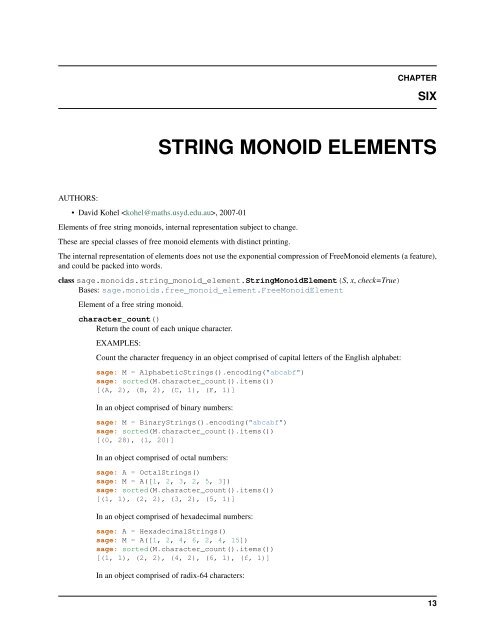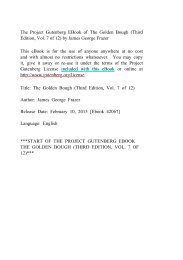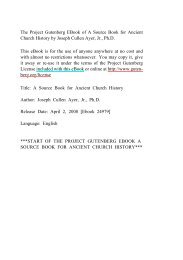Sage Reference Manual: Monoids - Mirrors
Sage Reference Manual: Monoids - Mirrors
Sage Reference Manual: Monoids - Mirrors
Create successful ePaper yourself
Turn your PDF publications into a flip-book with our unique Google optimized e-Paper software.
CHAPTER<br />
SIX<br />
STRING MONOID ELEMENTS<br />
AUTHORS:<br />
• David Kohel , 2007-01<br />
Elements of free string monoids, internal representation subject to change.<br />
These are special classes of free monoid elements with distinct printing.<br />
The internal representation of elements does not use the exponential compression of FreeMonoid elements (a feature),<br />
and could be packed into words.<br />
class sage.monoids.string_monoid_element.StringMonoidElement(S, x, check=True)<br />
Bases: sage.monoids.free_monoid_element.FreeMonoidElement<br />
Element of a free string monoid.<br />
character_count()<br />
Return the count of each unique character.<br />
EXAMPLES:<br />
Count the character frequency in an object comprised of capital letters of the English alphabet:<br />
sage: M = AlphabeticStrings().encoding("abcabf")<br />
sage: sorted(M.character_count().items())<br />
[(A, 2), (B, 2), (C, 1), (F, 1)]<br />
In an object comprised of binary numbers:<br />
sage: M = BinaryStrings().encoding("abcabf")<br />
sage: sorted(M.character_count().items())<br />
[(0, 28), (1, 20)]<br />
In an object comprised of octal numbers:<br />
sage: A = OctalStrings()<br />
sage: M = A([1, 2, 3, 2, 5, 3])<br />
sage: sorted(M.character_count().items())<br />
[(1, 1), (2, 2), (3, 2), (5, 1)]<br />
In an object comprised of hexadecimal numbers:<br />
sage: A = HexadecimalStrings()<br />
sage: M = A([1, 2, 4, 6, 2, 4, 15])<br />
sage: sorted(M.character_count().items())<br />
[(1, 1), (2, 2), (4, 2), (6, 1), (f, 1)]<br />
In an object comprised of radix-64 characters:<br />
13
















